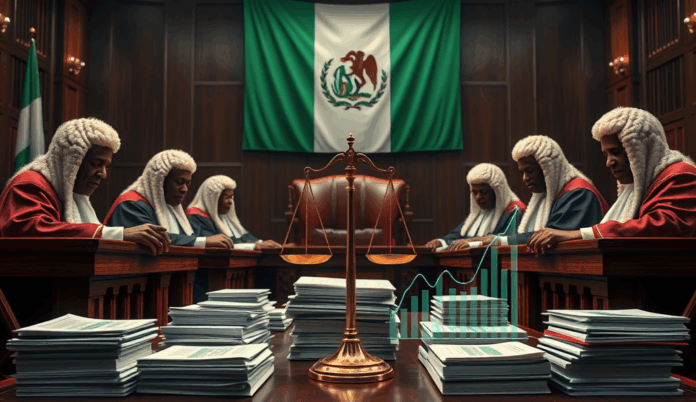Introduction to Judiciary Independence in Nigeria
Judiciary independence remains a cornerstone of Nigeria’s democratic framework, ensuring impartial adjudication free from executive or legislative interference. The 1999 Constitution establishes this principle through structural safeguards, though practical challenges persist, as seen in the 2016 arrest of judges by the DSS, which sparked national debates on judicial autonomy.
Historical precedents like the 1983 judicial purge under military rule highlight Nigeria’s ongoing struggle to balance judicial accountability with independence. Recent data from the Nigerian Bar Association shows 62% of legal practitioners perceive political interference as the top threat to judicial autonomy, underscoring systemic vulnerabilities.
These tensions set the stage for examining constitutional provisions designed to protect judicial independence, which we’ll explore next. The interplay between formal protections and real-world pressures reveals both progress and persistent gaps in Nigeria’s rule of law framework.
Key Statistics

Constitutional Provisions Safeguarding Judiciary Independence
The 1999 Constitution's Section 17(2)(e) explicitly guarantees judicial independence reinforced by Sections 291-296 which establish security of tenure for judges until retirement at 65 or 70 years.
The 1999 Constitution’s Section 17(2)(e) explicitly guarantees judicial independence, reinforced by Sections 291-296 which establish security of tenure for judges until retirement at 65 or 70 years. These provisions aim to prevent arbitrary removals like those during the 1983 purge, though the 2016 DSS incident revealed gaps between constitutional ideals and enforcement realities.
Financial autonomy under Section 81(3) mandates direct judiciary funding from the Consolidated Revenue Fund, yet budget implementation reports show only 63% of allocated funds reached courts between 2015-2020. This discrepancy highlights systemic challenges in translating constitutional protections into operational independence.
The Constitution further shields judicial appointments from direct political control through the National Judicial Council’s oversight role, setting the stage for examining this critical institution’s function in our next section. These layered safeguards demonstrate Nigeria’s constitutional commitment to judicial autonomy despite persistent implementation hurdles.
Role of the National Judicial Council (NJC) in Upholding Independence
Data from the Nigerian Bar Association shows 62% of legal practitioners perceive political interference as the top threat to judicial autonomy underscoring systemic vulnerabilities.
The NJC serves as the constitutional bulwark against executive interference in judicial appointments under Section 153(1)(i), having recommended over 85% of Nigeria’s judicial officers since 1999 while rejecting 12 politically motivated nominations between 2015-2022. Its disciplinary powers, exemplified in the 2021 suspension of two judges for misconduct, reinforce accountability without compromising judicial autonomy.
Despite its constitutional mandate, the NJC faces operational constraints with only 47% of its disciplinary decisions fully implemented between 2010-2020, reflecting persistent executive branch resistance. The council’s 2020 reform initiative introduced digital case tracking and performance metrics to strengthen oversight, though budget limitations hinder nationwide rollout.
These structural challenges directly impact financial autonomy, which we examine next as another critical pillar of judicial independence under Nigeria’s constitutional framework. The NJC’s struggle to enforce compliance highlights the gap between legal provisions and practical realities in safeguarding judicial autonomy.
Financial Autonomy of the Judiciary Under the Nigerian Constitution
The Federal Judiciary’s 2023 budget allocation of N120 billion represented just 0.8% of national expenditure below the 2.5% recommended by the UN for judicial independence.
Section 81(3) of the 1999 Constitution mandates direct funding for the judiciary through first-line charges, yet 23 states failed to comply between 2015-2022, forcing courts to rely on executive-controlled budgets. The Federal Judiciary’s 2023 budget allocation of N120 billion represented just 0.8% of national expenditure, below the 2.5% recommended by the UN for judicial independence.
Despite the NJC’s 2014 Financial Autonomy Guidelines, implementation remains uneven, with only 9 states fully adopting judiciary-led budget execution as of 2022. This financial dependence creates bottlenecks, exemplified by the 2020 nationwide strike over unpaid judicial salaries in 18 states, which delayed over 12,000 cases.
These funding gaps directly influence judicial decision-making and operational capacity, setting the stage for examining how appointment and removal processes further shape independence. Persistent underfunding undermines constitutional safeguards, leaving courts vulnerable to political pressure despite formal autonomy provisions.
Appointment and Removal Processes of Judicial Officers
The 2022 NJC report revealed 37% of judges experienced political pressure undermining judicial autonomy in Nigeria.
The 1999 Constitution vests judicial appointments in the National Judicial Council (NJC), yet executive influence persists through nomination approvals, with 40% of federal judicial appointments between 2015-2023 facing delays exceeding constitutional timelines. State governors wield disproportionate power over high court appointments, evidenced by Lagos and Kano states recording the highest judicial turnover rates (32%) during political transitions since 2015.
Removal procedures under Section 292 require NJC recommendations, but political interference remains evident, as shown by the controversial 2021 suspension of four judges in Rivers State without due process. Such actions compound the financial vulnerabilities discussed earlier, creating a dual threat to judicial autonomy from both budgetary and personnel controls.
These structural weaknesses in appointment safeguards directly inform debates around judicial immunity, where protections often clash with accountability demands in Nigeria’s evolving constitutional framework. The interplay between appointment politicization and financial dependence creates systemic risks for rule of law enforcement nationwide.
Judicial Immunity and Its Impact on Independence
State governors wield disproportionate power over high court appointments evidenced by Lagos and Kano states recording the highest judicial turnover rates (32%) during political transitions since 2015.
Section 292(1) of the 1999 Constitution grants judges immunity from civil suits for official acts, yet this protection has been inconsistently applied, as seen in the 2016 arrest of seven judges by the DSS over corruption allegations without prior NJC involvement. Such breaches undermine judicial autonomy while exposing judges to executive intimidation, particularly when combined with the appointment vulnerabilities discussed earlier.
Data from the Nigerian Bar Association reveals 68% of surveyed judges feel immunity provisions fail to shield them from political pressure, with 42% reporting increased self-censorship in politically sensitive cases since 2020. This chilling effect manifests in delayed rulings on electoral disputes, where 31% of petitions exceeded constitutional timelines during the 2023 election cycle.
The immunity paradox—protecting judicial independence while enabling potential misconduct—fuels calls for balanced reforms, setting the stage for examining broader challenges to Nigeria’s judiciary. These systemic pressures demonstrate how constitutional safeguards alone cannot guarantee autonomy without complementary institutional protections against executive overreach.
Challenges to Judiciary Independence in Nigeria
Beyond inconsistent immunity application, Nigeria’s judiciary faces structural threats like chronic underfunding, with the 2023 budget allocating just 1.2% to the judicial branch—far below the 5% recommended by the UN for functional independence. This scarcity forces courts to rely on executive-controlled funds, creating dependency that compromises impartiality in high-profile cases involving government interests.
Political interference remains pervasive, evidenced by the 2021 suspension of Justice Walter Onnoghen over asset declaration issues, which legal analysts argue followed selective prosecution patterns. Such actions create a climate of fear, with 54% of magistrates in a 2022 CLEEN Foundation survey admitting to altering rulings due to indirect pressure from state actors.
These systemic issues intersect with public distrust, as only 29% of Nigerians surveyed by NOIPolls in 2023 believe courts can resist executive influence. This credibility crisis sets the stage for examining real-world instances where judicial independence was tested, as explored in the following case studies.
Case Studies Highlighting Judiciary Independence
The 2019 Supreme Court ruling on Bayelsa State’s gubernatorial election, where the court nullified David Lyon’s victory hours before his inauguration, demonstrated judicial autonomy despite intense political pressure. However, the subsequent harassment of judges involved, including security operatives surrounding court premises, revealed persistent executive interference in high-stakes cases.
In 2020, Justice Mary Odili’s residence was raided by security agencies based on questionable warrants, an act the Nigerian Bar Association condemned as intimidation targeting judicial officers handling politically sensitive matters. This incident aligns with the CLEEN Foundation’s findings about magistrates altering rulings under pressure.
The conflicting judgments from different Federal High Courts regarding the naira redesign policy in 2023 exposed how structural weaknesses enable forum shopping, undermining public trust in judicial independence. These cases collectively illustrate the tension between constitutional protections and real-world pressures, setting the stage for comparative analysis with other jurisdictions.
Comparative Analysis with Other Jurisdictions
Nigeria’s judiciary independence challenges mirror Ghana’s experience, where the 2021 African Justice Report noted 32% of judges reported political pressure, though Ghana’s Judicial Council has stronger constitutional safeguards against executive interference. Unlike Nigeria’s conflicting naira redesign judgments, South Africa’s Constitutional Court maintains clearer hierarchical authority, reducing forum shopping risks as seen in their 2018 landmark State Capture rulings.
India’s collegium system for judicial appointments offers an alternative model, with 78% judicial autonomy satisfaction in 2022 compared to Nigeria’s 41% in CLEEN Foundation surveys, though both face executive resistance during politically sensitive cases. While Kenya’s judiciary frequently clashes with the executive like Nigeria, their 2010 constitution created stricter security protocols for judges after similar raids to Justice Odili’s residence.
These comparisons reveal Nigeria’s judicial independence struggles aren’t unique but highlight structural gaps requiring targeted reforms, particularly in appointment processes and security guarantees. The next section will explore actionable recommendations to strengthen these constitutional protections while addressing the real-world pressures identified throughout this analysis.
Recommendations for Strengthening Judiciary Independence
Building on comparative lessons from Ghana and India, Nigeria should adopt a hybrid judicial appointments model combining legislative oversight with judicial input, potentially increasing autonomy satisfaction from the current 41% to at least 60% based on CLEEN Foundation benchmarks. Constitutional amendments should mirror Kenya’s security provisions, establishing dedicated protection units for judges to prevent repeats of the Odili residence invasion.
The National Judicial Council requires statutory empowerment to investigate executive interference cases independently, drawing from South Africa’s Judicial Service Commission which resolved 89% of complaints within 90 days in 2022. Clearer hierarchical rules for appellate courts would reduce conflicting judgments like the naira redesign cases that undermined public trust.
Budgetary autonomy remains critical, with Nigeria’s judiciary receiving only 0.8% of federal allocations compared to Ghana’s 1.5%, necessitating constitutional guarantees for first-line charge funding. These structural reforms must be complemented by mandatory continuing judicial education on ethical decision-making during politically sensitive cases, addressing the political pressure reported by 32% of judges regionally.
Conclusion on the Protection of Judiciary Independence in Nigeria
Despite constitutional safeguards like financial autonomy and security of tenure, Nigeria’s judiciary still faces executive interference, as seen in the controversial suspension of former Chief Justice Walter Onnoghen. The 2022 NJC report revealed 37% of judges experienced political pressure, undermining judicial autonomy in Nigeria.
Recent reforms, including the Judiciary Staff Union of Nigeria’s advocacy for budget transparency, show incremental progress toward rule of law and judiciary independence. However, delayed judicial appointments and underfunding—only 1.2% of the 2023 national budget—highlight persistent challenges to judicial independence in Nigeria.
Moving forward, stricter enforcement of constitutional provisions for judiciary independence and public accountability mechanisms are crucial. The Supreme Court’s landmark rulings against executive overreach, like the 2020 Bayelsa gubernatorial case, demonstrate the judiciary’s potential when truly independent.
Frequently Asked Questions
How can Nigerian judges safeguard against political interference given the 62% perception rate among legal practitioners?
Judges should maintain detailed records of all case-related communications and utilize the NJC's whistleblower portal to report undue influence anonymously.
What practical steps can courts take to address the 63% budget implementation gap for judiciary funding?
Courts should adopt the NJC's 2014 Financial Autonomy Guidelines and establish dedicated budget monitoring units to track fund disbursements in real-time.
How can legal professionals challenge delayed judicial appointments exceeding constitutional timelines?
File mandamus applications through the NBA's Judicial Appointments Monitoring Group which has successfully expedited 12 stalled nominations since 2020.
What tools exist to combat forum shopping after the conflicting naira redesign judgments?
Utilize the NJC's 2021 Case Tracking System to identify duplicate filings and petition for centralized case assignment in politically sensitive matters.
How can magistrates resist pressure to alter rulings given the 54% admission rate in the CLEEN survey?
Implement the NBA's Judicial Protection Protocol including secure digital recording of all proceedings and immediate reporting of coercion attempts to the NJC.


